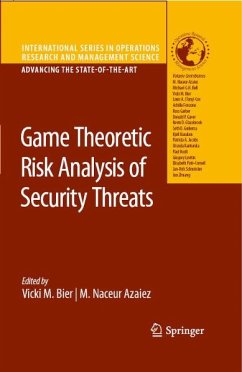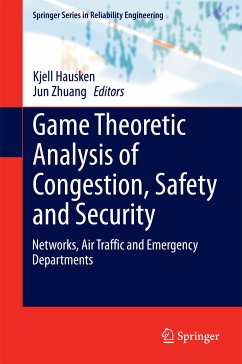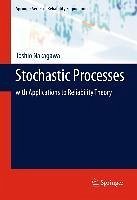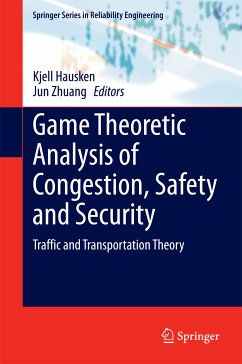
Game Theoretic Risk Analysis of Security Threats (eBook, PDF)
Versandkostenfrei!
Sofort per Download lieferbar
80,95 €
inkl. MwSt.
Weitere Ausgaben:

PAYBACK Punkte
40 °P sammeln!
Game Theoretic Risk Analysis of Security Threats introduces reliability and risk analysis in the face of threats by intelligent agents. More specifically, game-theoretic models are developed for identifying optimal and/or equilibrium defense and attack strategies in systems of varying degrees of complexity. The book covers applications to networks, including problems in both telecommunications and transportation. However, the book's primary focus is to integrate game theory and reliability methodologies into a set of techniques to predict, detect, diminish, and stop intentional attacks at targ...
Game Theoretic Risk Analysis of Security Threats introduces reliability and risk analysis in the face of threats by intelligent agents. More specifically, game-theoretic models are developed for identifying optimal and/or equilibrium defense and attack strategies in systems of varying degrees of complexity. The book covers applications to networks, including problems in both telecommunications and transportation. However, the book's primary focus is to integrate game theory and reliability methodologies into a set of techniques to predict, detect, diminish, and stop intentional attacks at targets that vary in complexity. In this book, Bier and Azaiez highlight work by researchers who combine reliability and risk analysis with game theory methods to create a set of functional tools that can be used to offset intentional, intelligent threats (including threats of terrorism and war). These tools will help to address problems of global security and facilitate more cost-effective defensive investments.
Dieser Download kann aus rechtlichen Gründen nur mit Rechnungsadresse in A, B, BG, CY, CZ, D, DK, EW, E, FIN, F, GR, HR, H, IRL, I, LT, L, LR, M, NL, PL, P, R, S, SLO, SK ausgeliefert werden.













